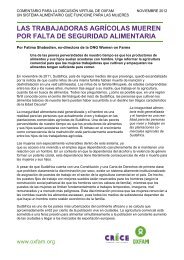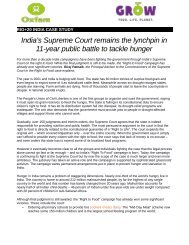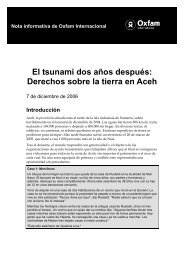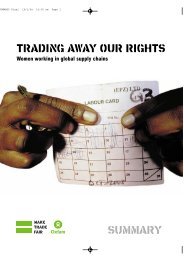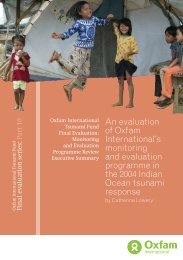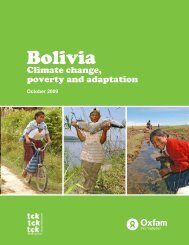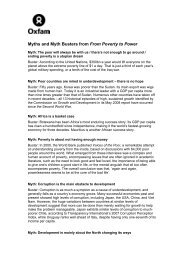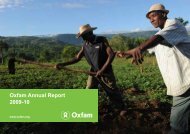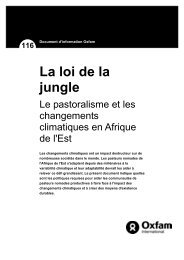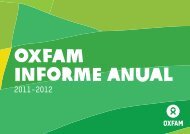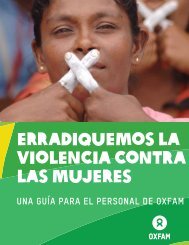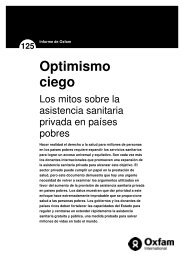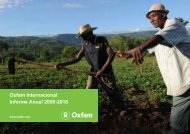Oxfam Strategic Plan, 2013-2019 - Oxfam International
Oxfam Strategic Plan, 2013-2019 - Oxfam International
Oxfam Strategic Plan, 2013-2019 - Oxfam International
You also want an ePaper? Increase the reach of your titles
YUMPU automatically turns print PDFs into web optimized ePapers that Google loves.
THE POWER OF PEOPLE AGAINST POVERTY 17<br />
OXFAM STRATEGIC PLAN, <strong>2013</strong> – <strong>2019</strong><br />
Objectives for <strong>2019</strong><br />
• Assistance: By <strong>2019</strong>, supported by the international<br />
community and humanitarian organizations, local state<br />
institutions and civil society in the most crisis prone/<br />
affected countries are able and willing to deliver high<br />
quality, impartial and independent assistance to those in<br />
need<br />
• Resilience: By <strong>2019</strong> resilience to disasters and conflict<br />
is strengthened in high risk countries, through improved<br />
disaster preparedness and risk reduction, and building<br />
the capacity of civil society groups and communities, in<br />
particular women, to manage shocks, stresses and address<br />
root causes of conflict.<br />
• Rights and fragility: By <strong>2019</strong> more accountable governments,<br />
security forces and regional/international institutions will<br />
ensure greater respect for the basic rights of crisis affected<br />
men and women and have put the most fragile states on the<br />
path to development.<br />
• Women’s rights: By <strong>2019</strong> the different impact of conflict and<br />
disasters on men and women, and their differing needs, are<br />
recognized and addressed by duty bearers and humanitarian<br />
organizations, leading to greater gender justice and respect<br />
for women’s rights in crisis affected countries.<br />
Achieving the goal<br />
• More effective crisis response, both through <strong>Oxfam</strong>’s own<br />
capacity and increasingly through the capacity of other<br />
organizations, partners and communities.<br />
• Increasing our work to reduce the risk of disasters (DRR) and<br />
build the resilience of communities, drawing from experience<br />
and learning from existing programs with civil society.<br />
• Strengthen the institutional capacity of states to respond<br />
to crises, working in a set of selected countries to drive<br />
transformative change at the global level.<br />
• Influence others and campaign for the respect of the rights<br />
of communities who are at risk or affected by conflicts and<br />
disasters at the grassroots, national, regional and global<br />
levels.<br />
• Support poor women and their organizations in emergency<br />
preparedness, risk reduction and response, through<br />
intensive capacity building and partnerships, by assisting<br />
women and men to safely voice their concerns and hold duty<br />
bearers accountable.<br />
Expected impact by <strong>2019</strong><br />
Fewer men, women and children will die or suffer<br />
illness, insecurity and deprivation by reducing the<br />
impact of natural disasters and conflict. Those most at<br />
risk will have exercised their right to have clean water,<br />
food and sanitation and other fundamental needs met,<br />
to be free from violence and coercion, and to take<br />
control of their own lives in dignity.<br />
Goal 4:<br />
Sustainable food<br />
Advancing the right of poor people to adequate and<br />
sustainable livelihoods has been a cornerstone of <strong>Oxfam</strong>’s<br />
work for many decades. It has inspired and shaped our rural<br />
development work, our support for agricultural innovation<br />
and our campaigns for international trade justice.<br />
The complex interaction between food, land, water, trade<br />
and energy, combined with price volatility, and the growing<br />
ecological crisis means over the next decade the food<br />
system is under unprecedented stress. The development<br />
agenda must deliver on the potential for smallholder<br />
agriculture to thrive, and to reduce poverty and inequality.<br />
Climate change will hit small-scale producers, subsistence<br />
farmers and rural and urban landless people harder over<br />
the next decade and the need for greater resilience is<br />
changing the way <strong>Oxfam</strong> approaches its work in rural and<br />
urban development. Campaigning on climate change, land<br />
grabs and other agriculture-related issues in the ‘GROW’<br />
portfolio, will be core to the advocacy agenda through the<br />
period of the <strong>Strategic</strong> <strong>Plan</strong>.



